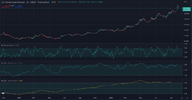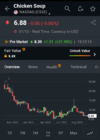- Joined
- 28 May 2020
- Posts
- 7,154
- Reactions
- 13,942
The annual inflation rate for August comes in at 6.8%.
This is down from the 7% in July.
Good news we think inflation has peaked.
Not so fast.
From ABC News
So it will be difficult to see other items decreasing sufficiently to overcome the fuel excise inflationary boost.
The ABC blotted their copy book with the last statement of the report.
Mick
This is down from the 7% in July.
Good news we think inflation has peaked.
Not so fast.
From ABC News
With the addition of fuel excise back into fuel, there is a 28 cents a litre increase from now until the next time they dump it.The slight fall in the annual inflation rate from July to August was mainly due to a decrease in prices for automotive fuel," he said.
In the year to August, the data show inflation for food and non-alcoholic beverages increased by 9.3 per cent.
Prices rose sharply across most food categories, led by fruit and vegetables, which jumped from 9.1 per cent inflation in June to 18.6 per cent in August.
However, overall, the annual rate of inflation — according to the monthly data — slowed down a little bit between July and August.
So it will be difficult to see other items decreasing sufficiently to overcome the fuel excise inflationary boost.
The ABC blotted their copy book with the last statement of the report.
I could have sworn they started increasing rates since May.It comes after the Reserve Bank began cutting interest rates in May.
Mick


